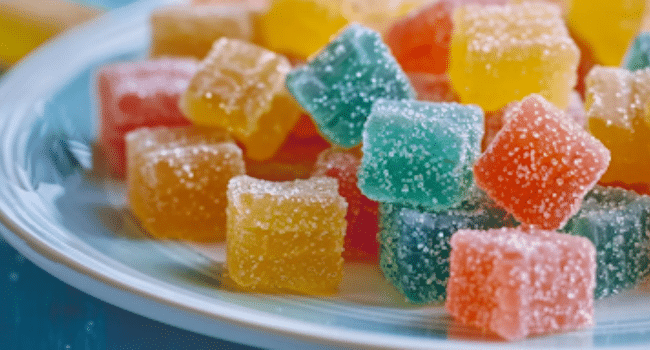Table of Contents
As the world of cannabis continues to grow and diversify, one particular topic gaining attention is THCA edibles. Unlike their THC counterparts, THCA edibles offer a different experience and array of potential benefits. Unfamiliar to many, tetrahydrocannabinolic acid (THCA) is a non-psychoactive cannabinoid found in raw and live cannabis. As the industry evolves, it becomes crucial to understand these unique products, their usage, and their legal standing. Below, we delve into the world of THCA edibles to provide clarity and guidance for those curious about incorporating them into their wellness routine.
Understanding THCA in Cannabis Edibles
THCA is the natural precursor to THC, found in raw cannabis before heat or light converts it into its psychoactive form. Unlike THC, THCA does not produce a high, making it appealing to those seeking potential therapeutic effects without mind-altering experiences. This distinction has led to growing interest in edibles that preserve THCA in its raw state.
Manufacturers carefully control temperature and packaging to maintain THCA’s stability in products like gummies and tinctures. For consumers asking what are the benefits of THCA edibles?, the answer lies in their ability to deliver non-psychoactive properties while ensuring the compound remains intact and effective when properly stored.
The Transformation of THCA to THC: Decarboxylation Explained
Decarboxylation is the process that transforms THCA into THC through heat, which explains why smoking or vaporizing cannabis produces psychoactive effects. This reaction is essential in making traditional THC edibles, as it activates the compound’s intoxicating properties. In contrast, THCA edibles are carefully prepared to avoid this transformation, keeping the cannabinoid in its raw, non-psychoactive form. Manufacturers deliberately prevent excess heat exposure, ensuring the benefits of THCA remain intact without inducing a high.
Time, temperature, and environmental factors all influence decarboxylation, making precision crucial in cannabis preparation. For producers, maintaining THCA integrity requires strict control of heating methods. For consumers, understanding this process allows them to adjust potency when creating homemade infusions, choosing between preserving THCA’s properties or activating THC’s psychoactive effects.
Benefits and Effects of THCA Edibles on the Body
THCA is drawing attention in the medical cannabis field for its potential health benefits. Early studies suggest it may reduce inflammation, offering support for people with conditions linked to chronic swelling and pain. Researchers also note its possible neuroprotective role, which could aid those facing neurodegenerative diseases. While evidence is still emerging, THCA’s interaction with the endocannabinoid system points to promising effects on biological processes tied to well-being.
For consumers, THCA edibles provide a unique option that supports wellness without the psychoactive effects of THC. This allows for consistent use without disrupting focus or daily activities. Growing interest has led more people to seek reliable resources on the benefits of THCA edibles.
Legal Status and Accessibility of THCA Edibles
The legal status of THCA remains complicated, as it is closely tied to broader cannabis laws. In regions where cannabis is legal, THCA edibles usually fall under similar regulations, though debates continue due to THCA’s non-psychoactive nature. Some jurisdictions struggle to distinguish between THCA and THC, which directly impacts availability, distribution, and consumer access. Growing demand is pushing regulators to reassess existing frameworks, highlighting the need for clearer policies around non-psychoactive cannabinoids.
Market interest and manufacturer readiness also influence the accessibility of THCA edibles. As awareness increases, availability is expected to expand, but legality remains inconsistent. Consumers and vendors must carefully track legislative updates to remain compliant, as cannabis regulations continue to evolve rapidly across different regions.
Best Practices for Using THCA Edibles Safely and Effectively
Using THCA edibles requires attention to proper dosing and storage. Since THCA does not create the psychoactive effects of THC, beginners should still start with small amounts and increase gradually to find their ideal balance. Because responses vary from person to person, adjusting intake carefully ensures safe and effective results. Equally important is storing edibles in a cool, dark place to prevent unintentional decarboxylation, which can alter potency and degrade quality.
When choosing THCA edibles, consumers should look for products from trusted sources that provide transparent labeling and third-party lab testing. Verified cannabinoid content and ingredient clarity help ensure safety and consistency. For added assurance, consulting a healthcare professional or cannabis expert offers personalized guidance on how to incorporate THCA edibles into wellness routines.
Overall, THCA edibles represent an intriguing and promising area within the world of cannabis. By understanding their composition, benefits, and legal status, consumers can make informed decisions about incorporating these products into their lives. With proper use and consideration, THCA edibles can be a valuable addition to the growing array of wellness options derived from cannabis.
